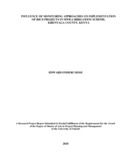| dc.description.abstract | This study sought to establish influence of monitoring approaches on the implementation rice projects in Mwea irrigation scheme. The study was held in the Mwea scheme, owned by the National Irrigation Board in Kirinyaga County. The study focused on four objectives; to establish the influence of results-based monitoring on implementation of rice projects; examine the influence of participatory monitoring on the implementation of rice projects, assess the influence of rapid appraisals on the implementation of rice projects and examine how monitoring approaches jointly influenced the implementation of rice projects. The study sought to test four alternate hypotheses which are; there’s significant relationship between results-based monitoring and implementation of rice projects; there is a significant relationship between participatory monitoring and the implementation of rice projects; there is a significant relationship between rapid appraisals and implementation of rice projects and finally there is a significant relationship between monitoring approaches and the implementation of rice. The study had a target population of 7,022 individuals who include farmers and the scheme managers. Using simplified Yamane formula of proportions, and corroborated by Krejcie and Morgan Table, (1970) a sample size of this study was 382 respondents. This study employed descriptive survey design since triangulation was desired. Close-ended questionnaires were used to collect quantitative data while the key informant interviews with scheme managers were used to collect qualitative data. Two research assistants helped the researcher collect quantitative data while the researcher collected qualitative data by himself. Proportionate random sampling was utilized in sampling individuals interviewed per cluster. The study questionnaire was pilot-tested two weeks prior to actual data collection process so as to refine its content and remove any ambiguities in questions asked. Content and construct validity were adopted to measure the appropriateness of the research instruments to be used while Cronbach’s Alpha was used to measure reliability of research instrument which gave a reliability composite measure of 0.744 meaning the structured questionnaire was reliable. Regression and correlation models were used to show extent of relationships between four independent variables; results-based monitoring, rapid appraisals and participatory monitoring against dependent variable; implementation of rice projects. From the data analyzed, It was confirmed that that all the variables under study influenced implementation of rice projects to an extent of F (2,208)=26.224;P<0.05; R2=0.244); for results based monitoring; participatory; F(2,208)=42.576, P<0.05; R2=0.467) participatory monitoring; F (2,208)=58.243,P<0.05; R2=0.484) and F (3,208)=33.476 P<0.05; R2=0.585) when all monitoring approaches are considered jointly using the F-values. The study independent variables also demonstrated high levels of correlation between themselves and the independent variable. This study therefore accepts all the four hypotheses measured and strongly recommends that monitoring approaches should be inculcated in project design and implementation in order to enhance efficiency and better results in project work. It is hoped this study will inform policy, contribute to new knowledge in the monitoring and evaluation discipline. | en_US |

